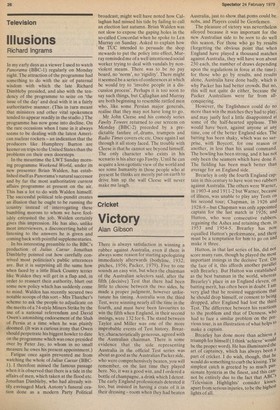Television
Illusions
Richard Ingrams
In my early days as a viewer I used to watch Panorama (BBC-1) regularly on Monday night. The attraction of the programme had something to do with the air of paternal wisdom with which the late Richard Dimbleby presided, and also with the tendency of the programme to seize on 'the issue of the day' and deal with it in a fairly authoritative manner. (This in turn meant that ministers and other vital spokesmen tended to appear readily in the studio.) The programme has now gone into decline. On the rare occasions when I tune in it always seems to be dealing with the latest American nuclear rockets — an indication that the producers like Humphrey Burton are keener on trips to the United States than the problems on their own doorsteps.
In the meantime the LWT Sunday morning programme Weekend World, under its new presenter Brian Walden, has established itself as Panorama's natural successor and by far the most authoritative current affairs programme at present on the air. This has a lot to do with Walden himself. The successful political tele-pundit creates an illusion that he ought to be running the country instead of interrogating these bumbling morons to whom we have foolishly entrusted the job. Walden certainly gives this impression. He has also, unlike most interviewers, a disconcerting habit of listening to the answers he is given and coming back with pointful supplementaries.
In his interesting preamble to the BBC's production of Julius Caesar Jonathan Dimbleby pointed out how carefully contrived most politician's public utterances are. But it is surprising all the same how when faced by a little Black Country terrier like Walden they will get in a flap and, in order to reassert their authority, blurt out some new policy which has suddenly come to mind. Walden has recently secured two notable scoops of this sort — Mrs Thatcher's scheme to ask the people to adjudicate on the merits of a 74-style Miners Strike by the use of a national referendum and David Owen's astonishing endorsement of the Shah of Persia at a time when he was plainly doomed. (It was a curious irony that Owen should perpetrate his biggest howler to date on the programme which was once presided over by Peter Jay, to whom in no small measure he owes his present appointment.) Fatigue once again prevented me from watching the whole of Julius Caesar (BBCH. I therefore missed the famous passage when it is observed that there is a tide in the affairs of men, which taken at the flood etc. Jonathan Dimbleby, who had already wittily envisaged Mark Antony's funeral oration done as a modern Party Political broadcast, might well have noted how Callaghan had missed his tide by failing to call an election last autumn. Brian Walden was not slow to expose the gaping holes in the so-called Concordat when he spoke to Len Murray on Sunday. Asked to explain how the TUC intended to persuade the shop stewards to put the policy into effect, Murray reminded me of a well intentioned social worker trying to deal with vandals by nonviolent means. There was to be no pay board, no 'norm', no 'rigidity'. There might it seemed be a series of conferences at which he would try to 'involve people in a discussion process'. Perhaps it is too soon to say such things, but Callaghan and Murray are both beginning to resemble rattled men who, like some Persian major generals, realise that they may not have long to go.
Mr John Cleese and his comedy series Fawlty Towers returned to our screens on Monday (BBC-2) preceded by a predictable fanfare of, drums, trumpets and Radio Times covers etc etc. Once again I sat through it all stony faced. The trouble with Cleese is that he cannot see beyond himself. The only character who exists in his scenario is his alter ego Fawlty. Until he can acquire a less egotistic view of the world and see some humanity in those people who at present he thinks are merely put on earth to drive him up the wall Cleese will never make me laugh.


































 Previous page
Previous page